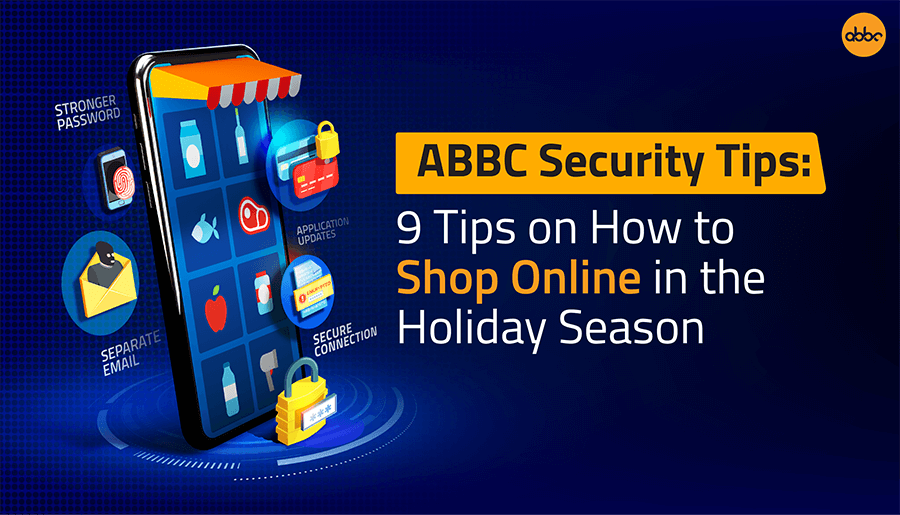The e-commerce industry is currently on a buzz as the holiday shopping season arrives. It’s that time of the year where gift-giving brings joy and excitement to kids, family, and friends.

As more and more people prefer to do shopping online over going to brick-and-mortar shops, the e-commerce industry becomes more vulnerable to security concerns. With the amount of data being processed in every online transaction, e-commerce ranked as the highest vulnerable industry, experiencing 32.4% cybersecurity attacks in various forms.
From a global perspective, only 38% of companies were able to handle these attacks successfully. In fact, the lack of e-commerce security knowledge against fraud resulted in a $6.4 billion worth of losses from data and security breaches.
As a cryptocurrency that aims to bring the future of payment security, we at ABBC want our users to be safe when shopping online. We laid out several guidelines every shopper can follow before, during, and after buying items.
Before you start browsing on your preferred e-commerce app or website, we advise you to practice the following:
1. Create a separate email for online shopping
There’s a famous saying stating that ‘you shouldn’t mix business and pleasure’.
This can be applicable when it comes to your email address. To avoid getting a crowded inbox, having a separate email address for a specific purpose is deemed to be more efficient. Therefore, it is practical for a shopper to create an email address specifically for online shopping.
This email will strictly be used only for signing up accounts or subscribing to any newsletters of an e-commerce website. Refrain from using your primary or business email to avoid any confusion or unnecessary messages coming in. This can also reduce the risk of opening and receiving any spam or malicious emails when you are checking out your personal messages.
2. Watch out for suspicious advertisements/emails
Phishing schemes are the most concerning threats of online shopping, especially during the holiday seasons. Due to the notoriety of brands like Amazon, eBay, and Groupon, it is common for scammers to take advantage of their credibility and come up with unrealistic and misleading offers and promotions.
You may receive promotional emails claiming to be one of the leading e-commerce giants of today. Instead of clicking on any attachments or links included in these emails, go straight to the website and check out if that promotion really exists or not.
Typically, sponsored ad campaigns can also be seen around the web targeting users with huge discounts and deals. Be vigilant of these advertisements as clicking may result in the exposure of your personal details or malware. If you are interested in the promo, visit the official website or social channels to check the details.
Tip: Hover your mouse over a link or ad to see the URL bottom of your email or browser page. If the URL appears to be too long with shady keywords, it is most likely a phishing scheme.
3. Keep mobile devices/applications updated
The number of smartphone users is expected to reach almost 3 billion by 2020. Among this population are online shoppers. Obviously, the top reasons why most shoppers prefer to use their mobiles when shopping are convenience, responsiveness, exclusive rewards, personalized content, and easier navigation.
In fact, e-commerce mobile applications are considered to be more secure than buying on the actual websites or on desktop. Malicious hackers needed to create specific attacks for applications, making it more safe against security issues.
You must make sure that your device — either Apple or Android — is updated to its latest operating system to ensure optimum user experience. Similarly, the e-commerce app you want to use should be updated to its latest version.
4. Make stronger passwords
We tend to overlook the importance of having strong passwords. But if you are a frequent online shopper, you have to consider that your accounts shouldn’t be easily susceptible to hackers. This is an important reminder, especially for cases wherein your payment details like credit or debit card number and address are saved within the web servers.
Update your older passwords with newer ones that are harder to guess but still easy to remember. Mix up symbols and characters to make it more complex. Do not use obvious details like your birthday, favorites, nickname, etc. as part of your password.
Additional tip does not use the same password for different accounts. For those who can easily forget their passwords, just try to take a note of it and keep it on a notepad on your device.
5. Do not overshare
Upon making an account or if you check your existing account, consider the amount of information you have revealed to your preferred e-commerce retailer. The more information you share, the higher the probability of you becoming a target of scammers.
If you think a piece of certain information is not really needed for you to have a smooth shopping experience, do not give it away. When possible, share only the basic information like name and email address when making e-commerce related accounts.
Be wary of any additional personal information is being asked in order for you to complete a purchase. Do not reveal anything confidential as this makes you more exposed to security threats.
6. Do not skip additional security layers
If there’s an option for you to enable a two or three-step authentication process on any online shopping sites, go ahead and set it up. Do not skip as these are vital in keeping the registered details of any user secured and harder to be accessed by unknown parties.
Do the extra mile of adding an extra layer of security to your account to ensure that you will be notified of any purchases made from your side. If you detect any suspicious activities being done using your card details, report it immediately.
You have more to gain and nothing to lose when you spend an extra 30 seconds of your time in completing these procedures — so please do it.
If you are now all set to begin crossing off items on your shopping list, please also keep in mind the following:
7. Make sure that your connection is secure
If you are outdoors and you decided to buy something online, kindly make sure that the network connection you will be linking to is secured. You should never purchase anything online if you are connected to an open Wi-Fi network. This will make your confidential things more vulnerable to hacking. You never know the intention behind other people who are using the same Wi-Fi.
Before clicking that ‘purchase’ button, make it a habit to check the URL bar on your browser and be sure that the address starts with https:// rather than http://. You can also check if there’s a little lock icon on the address bar to be assured that your online transactions will be protected.
It is better to have your own mobile data or share a hotspot connection with someone you know than accessing a public Wi-Fi. If you can wait until you get home to purchase any products online, that will also be better.
8. Do not be deceived with fake websites
There are approximately 24 million e-commerce stores selling their products around the world. Take note that not all of these sites are legitimate. Others just run away with the buyer’s money or compromise the quality of the items they deliver.
The first thing you will check would be the website design. You can instantly see if a website is just a copycat of a well-established e-commerce brand. If you still have doubts, check for any typographical errors, sketchy product descriptions, exaggerated promos, popup advertisements, and duplicated content.
Do not ignore the red flags that you can observe. Most often than not, if the products are too cheap (especially if branded) or the website navigation is too simple, it is fake. Do not attempt to sign up any accounts or input any of your card details to avoid identity theft and loss of funds.
9. Know your seller
For e-commerce marketplaces like Shein, Noon, and Amazon, various sellers are offering the same products at different prices. Before you choose any items, perform your due diligence. Check for the seller’s rating, reviews, shipping timeline, and product descriptions, among others.
Compare the differences between one seller to another by their number of successful deliveries, overall rating, and transparency of contact details. If you think a seller has been part of that e-commerce website for years now, they surely give good service to the customers. You can take the risk for newer sellers also as long as they show good statistics for their products.
If you want to know more about the seller, it will be better to call them for inquiries before you make any orders to clarify any policies like product returns or wrong delivery instances. Once you feel assured that the seller does not look bad, proceed to buy their items.
Once the cart has been checked out, you may now be waiting for your items to be delivered on your doorstep. Hoping that everything goes well — clothes and shoes suit your size while gadgets and appliances must work properly — we still have a few after-shopping reminders for you:
A. Check statements regularly
Be a smart shopper. We don’t have any judgments based on how frequent you shop online or how much are you spending. To know if your expenses matched your bills, check your bank e-statements and online receipts. Don’t wait for your end-of-the-month bill to cross-check your payments.
If you see any discrepancies or deductions from your accounts that you are not aware of, call your bank at once to settle any loss from your side.
B. Keep a record of your transactions
If you know that you have shopped from different e-commerce retailers, it is wise to list down somewhere the items you bought, as well as when and from which seller. This shopping audit can help you backtrack your expenses for a specific period of time.
We strongly recommend that you keep a copy of receipts of your purchases in case you want an item return or change, or you want to claim warranty from a damaged product.
Keeping a record of your shopping transactions can also help you accomplish your list faster! Better make sure not to miss any close friends or relatives, right?
Conclusion
Online shopping safety is an escalating concern among both e-retailers and shoppers. The former wants to protect its brand reputation and preserve its consumers’ trust, while the latter wants to know that their money and data are safe.
Please follow the above-mentioned tips to have a safe online shopping experience. We are aware that more and more people are becoming hooked to doing online shopping within the comfort of their homes, inside their offices, or even on-the-go. With this in mind, we are committed to delivering a blockchain and crypto solution for merchants and buyers. ABBC aims to make both merchants and buyers happy and satisfied — both in product quality and the amount of profits.
Focusing on this, ABBC CEO Jason Daniel Paul Philip stated that ABBC will go ahead of others by keeping “ourselves open to necessary changes and bridging the gap between cryptocurrency and online business.”
For other security reminders, check out our blog on how to stay secure online.


